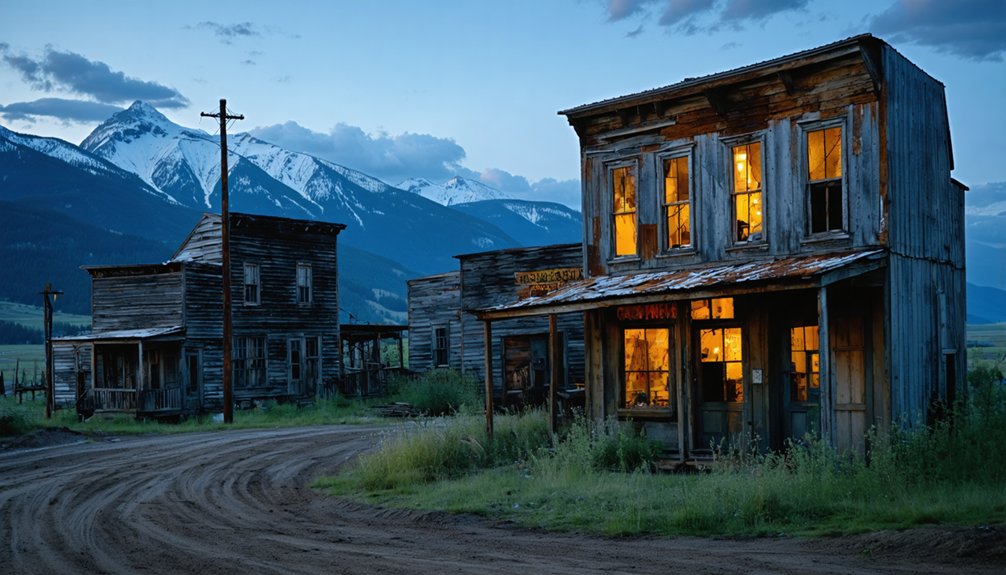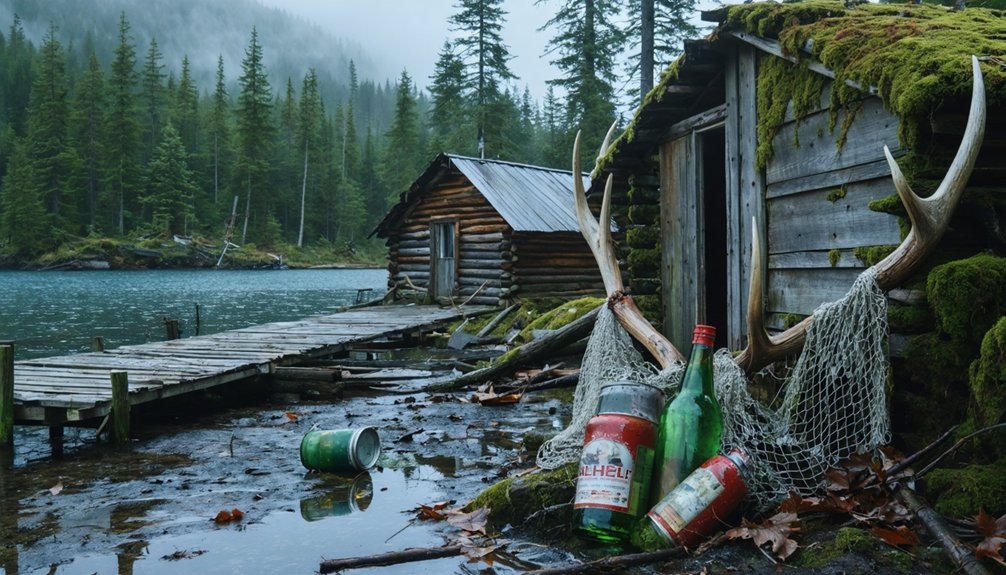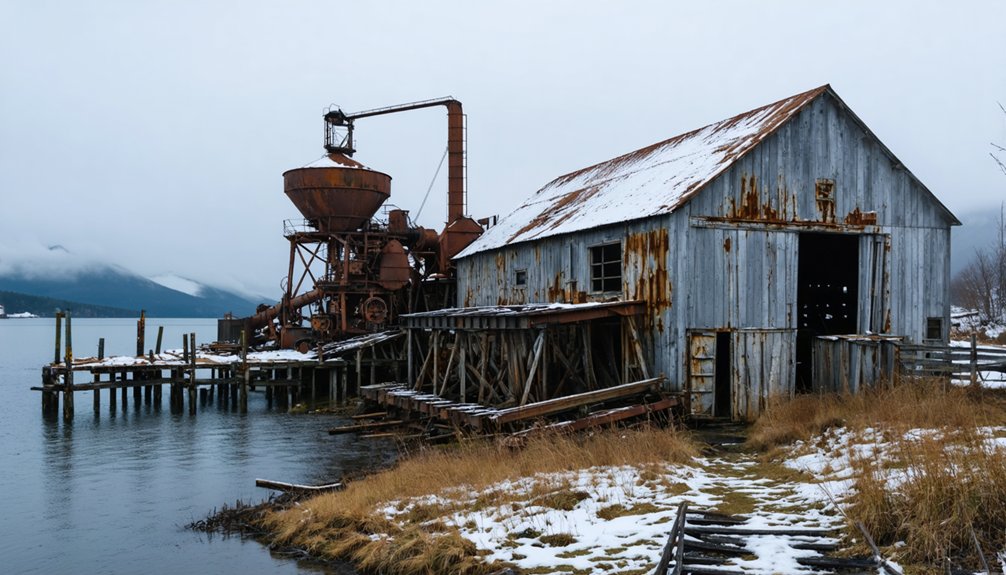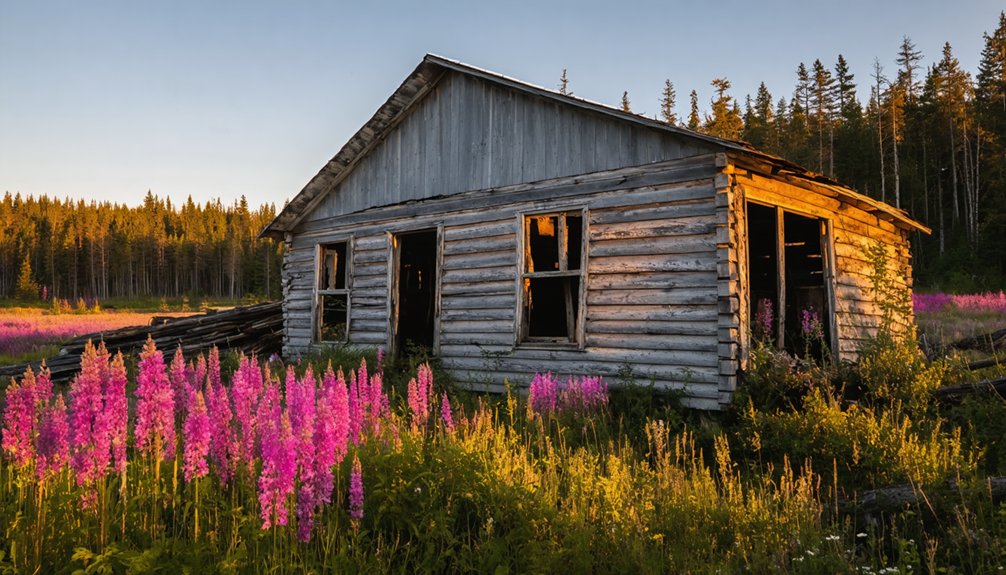Flat, Alaska emerged from a pivotal Christmas Day gold discovery in 1908 when John Beaton and William Dikeman struck pay dirt along Otter Creek. You’ll find this ghost town between the Kuskokwim and Yukon rivers, where it once thrived as a bustling frontier settlement of 6,000 residents by 1914. While the population dwindled to zero by 2010, Flat’s abandoned structures and mining remnants tell a fascinating story of boom-to-bust frontier life that shaped Alaska’s last major gold rush.
Key Takeaways
- Flat, Alaska became a booming gold rush town after a major gold discovery in 1908, reaching a peak population of 6,000 residents.
- The town served as the largest mining operation in the Iditarod district by the 1920s, featuring hotels, stores, and advanced dredging operations.
- A strategic transportation hub, Flat connected to Iditarod via railroad and horse-pulled tramway for mining supplies and equipment.
- Population declined sharply from 6,000 to 158 by 1920, with complete abandonment occurring by 2010.
- Located between Kuskokwim and Yukon rivers, Flat’s remaining structures document Alaska’s last major gold rush era.
The Christmas Day Gold Strike of 1908
The pivotal Christmas Day gold strike of 1908 occurred when prospectors John Beaton and William Dikeman discovered gold deposits along Otter Creek, a tributary of the Iditarod River in Alaska. Their discovery sparked the last major Alaska gold rush, though initial gold prospecting efforts faced skepticism due to the unusual granite bedrock of nearby Chicken Mountain, which differed from typical gold-bearing formations. The discovery attracted thousands of stampeders, with pay dirt found at a depth of twelve feet.
In spring 1909, Beaton and Dikeman staked their initial claims, soon followed by Tom Aitken and Riley who acquired major claims near Flat Creek. Their Marietta Association would become one of Alaska’s largest mechanized placer operations by 1911, employing roughly 100 men. The Marietta Association proved extremely profitable, leading to its sale for $1.5 million to the Guggenheim syndicate that same year.
The strike’s success transformed the region’s mining techniques from basic prospecting to large-scale industrial operations, producing about $30 million in gold within two decades.
Rise of a Frontier Boomtown
Following the momentous Christmas Day gold strike of 1908, Flat emerged as a bustling frontier settlement between Alaska’s Kuskokwim and Yukon rivers.
The settlement patterns quickly evolved from a small mining camp near Flat and Otter creeks into a thriving hub of commerce and industry. John Beaton and Dickeman established the town’s foundations as its pioneering founders. You’d have witnessed the rapid development of infrastructure, including hotels, stores, and a newspaper, as the population swelled to 6,000 by 1914. Early miners used wood fires to thaw the frozen tundra for gold extraction.
From humble mining beginnings, Flat exploded into a dynamic frontier town, boasting hotels, stores, and thousands of residents by 1914.
The community dynamics were shaped by Flat’s strategic position as the main supply center for the Iditarod Mining District.
You would’ve found a well-organized town complete with schools, restaurants, and essential services. The arrival of the railroad connection to Iditarod and the establishment of a post office further cemented Flat’s status as a crucial frontier boomtown.
Daily Life in Peak Mining Years
During Flat’s peak mining years around 1914, you’d have found a vibrant community of 6,000 residents whose daily lives centered around gold mining operations and essential services.
You could start your day at one of two local stores, grab a meal at the restaurant, or handle business at the post office. After work, you might join community gatherings at the pool hall or hotel.
Daily routines revolved around the town’s mining schedule, with children attending the elementary school while parents worked the claims. A horse-pulled tramway connected residents to the neighboring town of Iditarod for additional supplies and services. Similar to Iditarod, the town experienced rapid decline as gold deposits diminished and World War I began.
You’d have access to modern conveniences like telephone service and laundry facilities. For recreation, you could venture into the surrounding wilderness for hunting and fishing, or socialize with fellow miners from diverse backgrounds who’d made Flat their home.
Transportation Hub and Supply Center
You’ll find Flat’s early transportation infrastructure centered on its crucial railroad connection to Iditarod, which established the town as a critical supply hub for the mining district.
The railroad facilitated efficient movement of heavy mining equipment, food, and essential goods between the two towns, while supporting Flat’s growing commercial establishments.
Railroad Supply Networks
While Flat, Alaska was a small mining town, its railroad supply networks made it an important transportation hub in the Iditarod Mining District. The eight-mile horse-pulled wooden rail tramway between Flat and Iditarod created crucial supply routes for moving mining equipment, freight, mail, and provisions.
You’d find multiple stores, a hotel, and restaurants supporting the bustling mining economy. Like many early Alaskan railways, the line utilized surplus streetcar equipment from failed companies. The railroad’s impact transformed Flat into the district’s primary supply center by 1920, surpassing Iditarod in both population and commercial activity.
This infrastructure enabled efficient shipment of heavy equipment, especially dredges for the Yukon Gold Company. Significant services expanded to include telephone connections, allowing nearby camps to coordinate operations.
The railroad connection helped Flat grow to 6,000 residents by 1914, though this prosperity wouldn’t last beyond the 1930s.
Airstrip Strategic Advantage
Beyond its railroad connections, Flat’s airstrip transformed the town into a major transportation hub, linking remote southwestern Alaska to Fairbanks and Anchorage.
You’ll find the airstrip’s strategic position revolutionized regional logistics, enabling rapid delivery of supplies while reducing dependence on slower river transport.
Built on mining tailings, the aviation infrastructure proved essential when nearby Iditarod’s swampy terrain couldn’t support aircraft landings.
The airstrip logistics turned Flat into the primary supply center for the Iditarod Mining District by the 1920s-1930s.
You’ll see this impact through businesses like the Northern Commercial Company relocating to capitalize on improved air access.
While the surface could be hazardous, as evidenced by Wiley Post’s 1933 crash, the airstrip served as a critical lifeline for miners, merchants, and residents until the town’s eventual decline. The soft ground conditions at the airfield caused Post’s Winnie Mae aircraft to nose over during his around-the-world flight attempt.
Located 295 feet above sea level, the elevated position of Flat’s airstrip provided ideal conditions for year-round aviation operations.
Mining Operations and Economic Growth
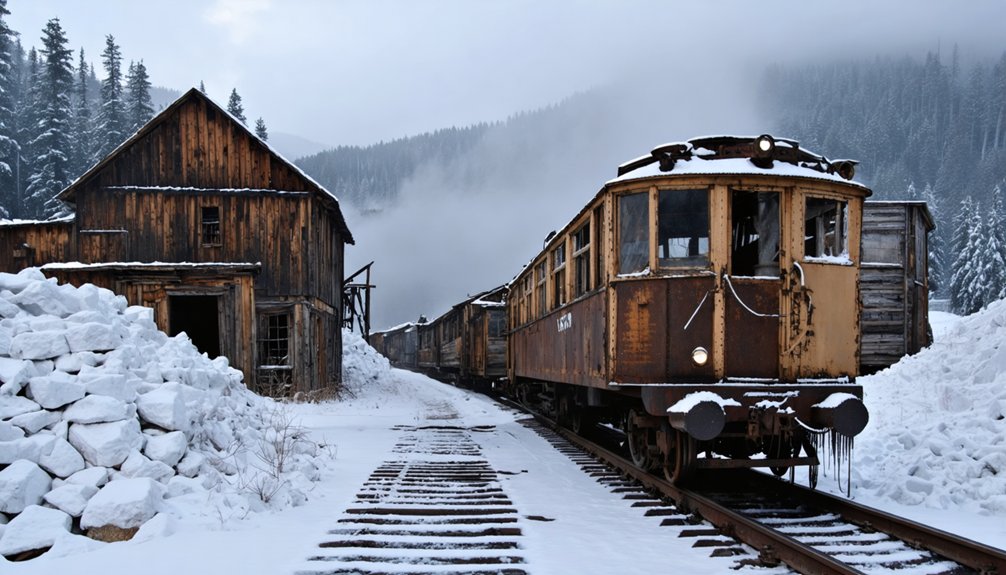
Although Flat began as a modest mining camp, it rapidly evolved into the Iditarod mining district’s largest operation by the 1920s, strategically positioned at the confluence of Flat and Otter creeks.
John Beaton and William Dikeman’s gold strike discovery on the Iditarod River in 1908 helped establish the region’s rich mining potential.
You’ll find that mining techniques here transformed dramatically when the Guggenheim syndicate invested heavily in 1911-1912, introducing mechanized operations and advanced dredging technology through their Yukon Gold Company subsidiary.
The town’s economic cycles were marked by significant capital flows, exemplified by Thomas Aitken’s $1.5 million sale to the Guggenheims.
Mining operations focused on extracting placer gold, with deposits ranging from low-grade bulk zones to rich pockets exceeding 20 g/t Au.
The industry’s success made Flat the region’s primary supply hub, driving infrastructure development including a 4,100-foot airstrip and extensive road networks.
The Great Population Exodus
You’ll find Flat’s population trajectory telling a stark story of boom and bust, peaking at 6,000 residents in 1914 during the gold rush‘s height before plummeting to just 158 by 1920.
The exodus continued relentlessly through the decades as mining operations dwindled, leaving only a single family of four to five year-round residents from 1986 to 2000.
Population Peak to Bottom
Three distinct phases marked Flat’s dramatic population decline from its peak of 6,000 residents in 1914 to complete abandonment by 2010.
The population dynamics reveal a stark historical significance in Alaska’s mining history, as you’ll witness the town’s remarkable dissolution over less than a century.
- Initial drop from 6,000 to 158 residents between 1914-1920 as early gold rush fever subsided
- Further decline to 124 people by 1930 as mining operations became less viable
- Gradual exodus until only one family remained from 1986-2000
- Final departure leading to zero population by 2010
The town’s rapid transformation from a bustling gold rush hub to a ghost town mirrors the broader pattern of boom-and-bust cycles in frontier mining communities, where freedom-seeking prospectors followed the next promising strike.
Mining’s Last Workers Leave
When the Guggenheim-owned Yukon Gold Company introduced large-scale dredging operations in Flat, the shift from manual labor to mechanization triggered a mass exodus of workers that would ultimately seal the town’s fate.
You’d have seen hundreds of prospectors replaced by just a few skilled operators as the last miners adapted to industrial-scale extraction methods.
The mechanization impact rippled beyond the mines themselves.
As mining companies reduced investment due to diminishing yields, you’d have watched local businesses close their doors.
Without economic alternatives, merchants like Z.J. Loussac relocated to growing towns like Anchorage.
The establishment of an airstrip, ironically built on smoothed tailings, made it easier for remaining workers to leave.
Preserved Remnants of the Gold Rush
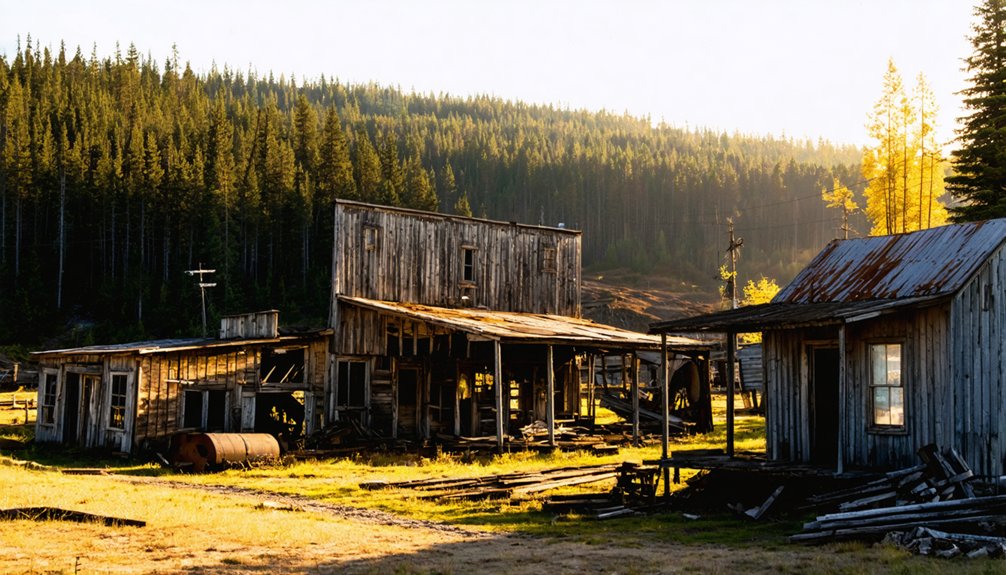
The preserved remnants of Flat’s gold rush era stand as tangible evidence of Alaska’s mining heritage, documented through a thorough 1993 historic structures survey.
Flat’s historic gold rush sites offer a well-documented window into Alaska’s mining past, preserved through careful surveying and restoration.
Through cultural preservation efforts, the U.S. Department of Interior partnered with Alaska to evaluate historic properties along the Iditarod National Historic Trail. These historical restoration projects protect invaluable insights into miners’ lives and their impact on the environment.
- Original mining structures showcase the town’s role as the largest camp in the Iditarod district
- Archaeological sites reveal the daily life of early 1900s gold rush settlers
- Historic trails and roads demonstrate the crucial transportation networks of the era
- Buildings and artifacts document the town’s evolution from a bustling supply center to a ghost town
You’ll find these remnants provide a direct connection to Alaska’s last great gold rush, preserving the spirit of frontier independence.
Geographic Challenges and Access
While Flat’s historic structures tell a compelling story of the gold rush era, its geographic setting presents formidable obstacles that have shaped both its past and present accessibility.
You’ll find the town nestled between the Kuskokwim and Yukon rivers at 295 feet elevation, where geographic isolation defines daily life. The subarctic climate brings extreme seasonal variations, with severe winters that make year-round access particularly challenging.
Environmental challenges include permafrost that destabilizes the ground, seasonal flooding that affects creek crossings, and natural forest regrowth that’s gradually obscuring old infrastructure.
Even today, you can’t easily reach Flat by vehicle – your best access remains limited to historical trail routes or seasonal approaches, much like during the gold rush days.
Legacy in Alaska’s Mining History
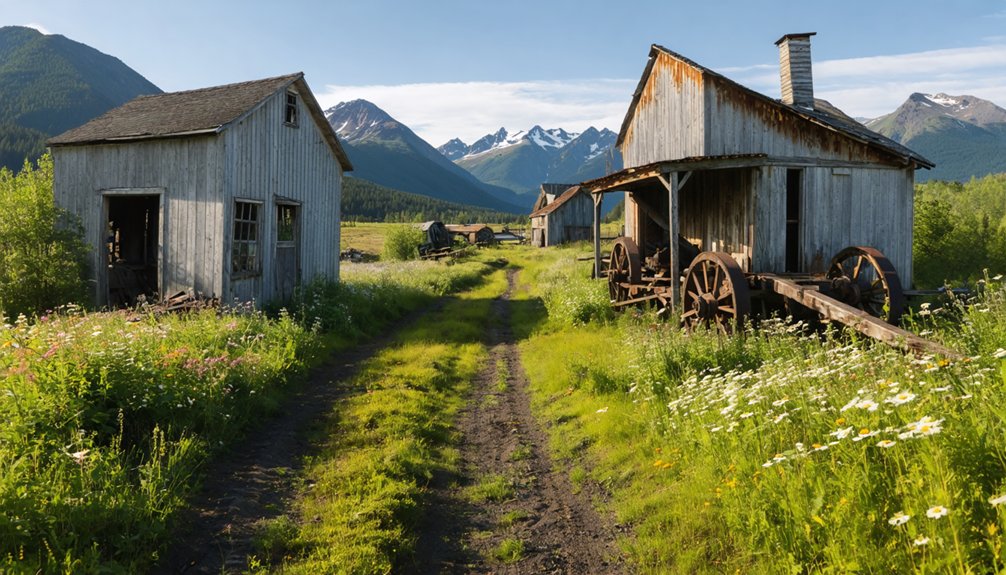
Founded during the 1908 gold discovery on Otter Creek, Flat quickly emerged as a vital force in Alaska’s mining landscape, transforming from a simple prospecting site into the Iditarod Mining District’s largest camp by 1914.
The town’s evolution showcases the dramatic impact of mining technology and community resilience in shaping Alaska’s development. When the Guggenheim Yukon Gold Company introduced mechanized dredging, it marked a significant change from individual prospecting to industrial-scale operations.
The shift from lone prospectors to industrial mining operations transformed not just Flat’s landscape, but Alaska’s entire economic foundation.
- Served as a vital logistics hub on the Iditarod Trail network, connecting remote mining camps from Seward to Nome
- Pioneered self-sufficient infrastructure with airstrips, rail connections, and year-round operations
- Demonstrated remarkable adaptability through technological changes in mining practices
- Represented the broader pattern of boom-and-bust cycles in Alaska’s mining communities
Frequently Asked Questions
What Happened to the Original Buildings and Mining Equipment After Abandonment?
You’ll find most abandoned structures collapsed over time, while others were relocated. Mining relics remain scattered across the site, deteriorating from weather exposure and neglect.
Were There Any Notable Crimes or Lawless Incidents During Flat’s Peak Years?
You’ll find few documented crime statistics or major lawlessness incidents from Flat’s peak years, though the presence of a jail suggests typical boomtown disorder requiring law enforcement oversight.
What Was the Average Temperature and Climate Conditions in Flat, Alaska?
Like a frozen fortress, you’ll face bitter winters with temps plunging to -13°C and mild summers reaching 12°C. Average precipitation hovers around 0.7 inches monthly, with high humidity and year-round 6mph winds.
Did Any Famous Historical Figures or Celebrities Ever Visit Flat?
You won’t find records of famous visitors or historical events involving celebrities in Flat. While the town hosted miners, traders, and business owners, no documented visits from notable figures exist.
How Much Total Gold Was Extracted From Flat’s Mines During Its Operation?
During mining operations in the Iditarod District, which includes your area of interest, gold extraction totaled over 1.5 million ounces, with Flat Creek specifically yielding approximately 650,000 ounces of placer gold.
References
- https://www.gi.alaska.edu/alaska-science-forum/iditarod-one-last-gold-rush-towns
- https://iditarod.com/edu/get-ready-to-visit-flat/
- https://archive.org/download/historicbuilding00buzz/Historic_Buildings_Survey_Report_Flat_Alaska_1997.pdf
- https://michael-hankins.com/2025/10/11/flat-alaska/
- https://en.wikipedia.org/wiki/List_of_ghost_towns_in_Alaska
- https://iditarod.com/2018/03/08/iditarod-gold-rush-to-ghost-town/
- https://archive.org/download/flatiditarod199300unse/Flat_Iditarod_Oral_History_Interviews_1997.pdf
- https://alaskamininghalloffame.org/inductees/aitken.php
- https://www.alaskahistory.org/biographies/beaton-john/
- https://en.wikipedia.org/wiki/Klondike_Gold_Rush
